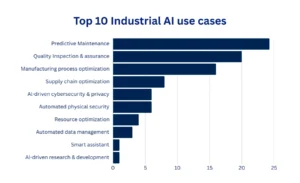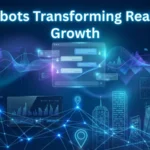AI use cases are transforming how companies conduct business in every sector, pushing efficiency, creativity, and improved decision-making. In healthcare, retail, finance, logistics, and more, AI enables companies to automate operations, create personalized experiences, and anticipate trends with a degree of accuracy never before achieved. Companies can streamline their operations and enhance customer satisfaction, deliver smarter results, by using AI technologies. With the help of an AI development company, they can leverage the technology in the form of machine learning, computer vision, and natural language processing. In this blog, we will discuss AI use cases in key industries and how businesses are changing operations with AI-based solutions.
Applications of AI in transforming Business Operations: The key use cases
Artificial Intelligence (AI) allows computers and other computer-controlled systems to execute tasks that normally involve human intelligence, including learning through experience, pattern recognition, and decision making. This technology is no longer futuristic; it is transforming the way businesses are run in industries.
AI simplifies business processes, automates repetitive processes, improves decision-making, and opens insights with data. AI optimizes supply chains, predicts maintenance needs, and provides personalized customer experiences, among other things, vastly increasing the efficiency of operations. It does not stop at cybersecurity, talent acquisition, and strategic planning, which make sure that organizations can remain agile in the current high-paced markets.
The rate at which AI use cases in businesses is increasing faster than ever before. According to market research, the global AI market will grow by nearly 14 times between 2022 and 2030 to more than 1.8 trillion, which demonstrates the growing dependence of organizations on AI use cases in order to achieve productivity, innovation, and competitive advantage.
The usefulness of AI in various industries is impressive. The use of AI in retail and e-commerce provides an opportunity to make shopping as personalized as possible, whereas AI in manufacturing offers predictive maintenance to decrease downtime. The role of AI in healthcare is to improve diagnostics and treatment planning, which is a transformation in the sector. The subsequent paragraphs discuss the most influential AI use cases in key sectors.
AI Use Cases Across Major Industries Transforming Business Operations
Healthcare: AI Restructuring Patient Care and Operations
The use of AI in healthcare is transforming how the practice is being performed by practitioners in diagnosis, treatment, and the management of patients. Patient care, enhanced diagnoses, and simplified operations will be enhanced by applying AI to machine learning algorithms, advanced analytics, and smart automation. The principal AI applications in healthcare include:
- Diagnostics and imaging: AI reads X-rays, CT scans, and the like with high precision and can detect multiple diseases, e.g., cancer, pneumonia, and osteoporosis.
- Individualized treatment plans: AI can prescribe specific treatments that integrate the history, genotype, and lifestyle of patients and predict potential complications and prescribe the best doses.
- EHR analysis and management: AI-based tools record electronic health records (EHRs) and can sometimes analyse trends, predict diseases, prevent adverse drug interactions, and also act as data management tools.
- Remote patient monitoring: AI tools can remotely monitor vital signs and indicators of treatment intention or adverse events in practice, facilitating earlier intervention and improved patient partnership and communication.
- Cost reduction and administrative efficiencies: AI anticipates and flags abnormalities in the payment process and therefore identifies fraud, improves administrative practices in healthcare, and lowers costs.
Retail and E-Commerce: AI on Customer Experience and Operations
The e-commerce and retail industry is rapidly adopting AI in an effort to offer customers a personalized experience, streamline operations, and make sales. The significant AI implementations in the retail and e-commerce sectors are:
- Personal Customer Service: AI analyzes the consumers, their behaviour, preferences, and purchasing habits, providing suggestions on the items that are unique to the customer, which enhances their interactions and purchases.
- Dynamic Pricing Optimization: AI takes into account the market dynamics, competitor pricing, and demand dynamics, and maximizes its prices to achieve the highest possible profits without being pushed out of the market.
- Inventory Control and Demand Prediction: AI predicts demand fluctuations and seasonal patterns, reduces overstocking and stockouts, and optimizes the supply chain.
- AI-Powered Customer Service: API chatbots are 24/7, order tracking, customer satisfaction, and loyalty.
- Image Recognition and Visual Search: AI may be deployed to enable shoppers to search using images, which automatically label objects and sort out the catalogs, simplifying the shopping process.
Banking and Financial Services: AI-based Smarter Finance
The AI is transforming security, customer experience, and operational efficiency in the banking and finance industry. Key AI use cases include:
- Fraud Detection and Prevention: AI examines the patterns of dealings in real time to indicate the abnormalities to reduce the chances of fraud.
- Credit Scoring and Risk Assessment: AI and ML algorithms use alternative data to get accurate creditworthiness and enhance risk management.
- AI Customer Service: Chatbots with AI provide real-time account services and personalized financial advice, which enhance satisfaction and response times.
- AML and Regulatory Compliance: AI automates monitoring of transactions to uncover suspicious behavior, enhance compliance, and mitigate operational risks.
- Portfolio and Wealth Management: AI forecasts the market and optimizes the investment strategy, and provides the clients with specific financial help.
Supply Chain and Logistics: AI, Energized
The AI within supply chain and logistics is changing the inventory, deliveries, and the whole process. Key AI use cases include:
- Warehouse Optimization: AI is used in the optimization of the warehouse plan through the inventory and demand data to optimize space and time in fulfilling the demand.
- Shipment Tracking and Route Optimization: AI monitors the shipment, forecasts delays, and determines the best route to move goods to deliver them on time and reliably.
- Demand Forecasting and Inventory Management: AI automatically replaces inventory, forecasts demand peaks, and optimizes errors by reducing stockouts and overstocking.
- Resource Allocation: AI predicts the demands of an operation and provides the effective management of resources to minimize the number of bottlenecks and exploiting the workforce.
- AI-Customer Service: Chatbots provide real-time order tracking and customer services, which make customers more satisfied and trusting.
Travel Industry: AI Improving Individualized Travel
The travel industry AI is transforming how people plan, book, and even experience travel overall by offering personalized itineraries, intelligent recommendations, and customer-hassle-free service. Key AI use cases include:
- Personal Travel: AI works out custom-made trips depending on the funds, preferences and interests and it is an online tour guide.
- Location-Based Recommendations: AIs recommend local places to see, overlooked sites, and tailored experiences based on the likes of travelers.
- Artificial Intelligence-Based Booking Assistance: Chatbots guide to the booking page, offer live support, compare prices, and offer suggestions of travel services.
- Smart Trip Planning: AI considers past patterns and tourists’ interests to create effective and entertaining travel arrangements.
- AI Customer Service: Chatbots deliver 24/7 services, answer queries, and receive feedback to enhance travel experiences.
Real Estate: AI Changing Property Management and Investments
Real estate AI is changing the character of decision-making by the investors, managers, and purchasers of property based on the examination of market trends, clientele inclinations, and property data. Key AI use cases include:
- Automation of Property Valuation: AI has the potential to evaluate property attributes as well as the market conditions to provide appropriate values to buyers, sellers, and investors.
- Property Management Automation: AI can automate property maintenance, tenant screening, and lease management, and remove all errors, making the process more efficient.
- Predictive Market Analytics: AI predicts property and investment opportunities’ prices, enables the use of data to make decisions, and minimizes risks.
- Automated Lead Identification: AI will identify potential high-tier buyers and tenants based on behavior, demographics, and preferences, thereby boosting conversions.
- Smart IP Recommendations: The search engine is AI-driven and suggests properties based on the interests of the users, location, and budget.
- Due Diligence Automation: The AI verifies documentation, anomalies, and regulatory compliance to reduce the risk of transactions.
Media and Entertainment: AI Changing Creativity and Interaction
With the assistance of AI, content production, distribution, and consumption in the media and entertainment industries are evolving depending on preferences, behavior, and engagement patterns. Key AI use cases include:
- Game Design: It has been used to apply artificial intelligence to game design to improve the behavior of non-playable characters, procedural content generation, and gameplay generation into real and challenging experiences.
- Refinement of storytelling: AI engages scripts and viewer analytics to ease plot, character development, and emotional connections.
- Video Editing Bot: AI finds face and analyzes frames to automatically generate trailers, select scenes, and edit movies.
- The Recommendation Engines: AI-driven content is applied to present the users with personalized content that is more interesting and memorable.
- AI Composition of Music: AI generates melodies, harmonic progression, and lyrics, which are genre, mood, and theme specific.
- Customized Advertisement: AI employs the analysis of the behavior of the audience to offer individuals particular advertisements, which increases ROI in marketing campaigns.

Production: AI Driving Efficiency, Quality, and Productivity
The application of AI in manufacturing is redesigning products and processes of manufacturing, and also managing quality of products using predictive analytics, automation, and real-time monitoring. Key AI use cases include:
- Defect Detection: AI detects defects in products at the earliest point to reduce wastage and recapitalization.
- Predictive Maintenance: AI predicting equipment problems will enable it to repair them before the problem occurs, which will minimize unplanned downtime.
- Process Optimization: Machine learning finds the inefficiencies, streamlines cycle times, consumes less energy, and is cheaper.
- Quality Control Automation: AI is applied to inspections of goods in order to conduct them in a consistent and comparable way and reach the established standards.
- AI-based Product Design: AI generates the best design models, generates scenarios to simulate manufacturing, and selects the most productive one.
Automotive: AI Driving Smarter Cars and Processes
Artificial intelligence is transforming the vehicle industry, both in design, manufacturing, and experience, adding improved performance and savings, as well as being able to make smarter decisions. Including:
- Smart traffic: AI uses real-time data to optimize traffic, reduce congestion, and increase highway safety.
- Predictive Maintenance: AI pulls data from cars to predict and avoid downtime and extend the life of the fleet.
- AI navigation: AI provides intelligent routes, real-time traffic, and intelligent transportation.
- Personalized Customer Experience: A Customer experience example can facilitate customized recommendations or services based on the profile and preferences of the driver.
- Production optimization: AI allows for better assembly of vehicles while reducing waste and maintaining quality.
Education: AI Revamping Learning and Administration
AI in learning is transforming the way students learn and the way institutions run by making learning personalized, smart, and automated. Key AI use cases include:
- Personalized Learning: Artificial intelligence looks at individualized requirements and changes courses and study material based on performance outcomes and interactions.
- Intelligent Tutoring Systems: The AI shall deliver adaptive teaching and immediate responses to facilitate students in constructing capacities.
- Automated Grading: Assignments, quizzes, and tests shall be checked by AI for grading students to save time and ensure sound decision-making.
- Learning Analytics: The data on students’ performance would be analyzed by AI to spot patterns and suggest certain interventions.
- Curriculum Development and Design: AI aids in the development of relevant curriculum and generates computerized digital learning resources.
IT: AI as the Engine of Efficiency and Innovation
IT intelligence is transforming how organizations work, secure, and offer their services by automating processes intelligently, predictively, and with artificial intelligence-driven tools. Key AI use cases include:
- IT Support and Helpdesk Automation: Chatbots and AI-driven virtual assistants will automate the problem-solving process and enhance customer experience.
- Cybersecurity and Threat Detection: AI will constantly monitor networks to recognize anomalies, repel attacks, and secure information.
- Data Analysis and Business Intelligence: AI will assist in data analysis and provide usable data for making decisions in real time.
- Software Testing and Development: AI will assist with coding, testing, and guarantee that it will enhance software reliability.
- Predictive IT Maintenance: Predictive modeling with AI technologies predicts system failure and minimizes downtime; interruption to operations is eliminated.
Conclusion
Industries are being transformed by AI use cases because it is making their operations more productive, improving the experiences of customers, and data is being utilized in decision-making. In finance and in retail, AI has continued to be an innovation source in terms of predictive analytics and personalised recommendations, respectively. Businesses that use AI solutions gain a competitive edge, automate their operations, and open up new avenues of growth. AnavClouds Analytics.ai is the solution to release the power of AI within your enterprise: the location where you are able to use robust AI and data-driven answers to create a distinction in how things are executed, the quality of insights, and the quality of final results.



